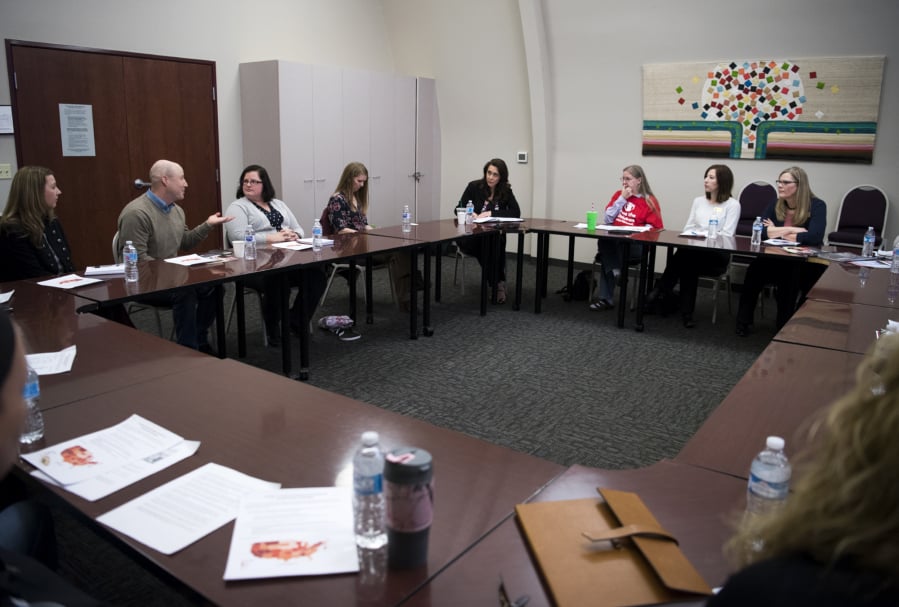Rep. Jaime Herrera Beutler, R-Battle Ground, visited YWCA Clark County Tuesday morning as part of her push for a bill that would boost federal funding for child care facilities in underserved areas.
The bill, the Child Care Workforce and Facilities Act, would allocate $100 million to states, for distribution to programs in “child care deserts” through a competitive application process. The idea is to create a larger network of quality child care facilities, as well as a pipeline of professionals to fill them.
Her staff put together Tuesday’s roundtable discussion to help her better understand the existing hurdles to quality, affordable child care, Herrera Beutler said.
“My goal really is to hear from you about the challenges, what you’re seeing that works, and what doesn’t work,” she told the room of child care providers and parents.
“It feels like this is a 20th century problem, not a 21st century problem,” she said. “Why is this what we’re dealing with?”
The problem
It’s a monster of an issue. Child care slots are scarce, with yearslong waiting lists, and many parents who do get their child into a program find them prohibitively expensive. The industry bleeds workers, too — despite pricey certification requirements and the exhausting nature of the work, the median hourly wage for a child care provider in Southwest Washington is $12 compared with $21.37 for the region in general.
“The true issue is that we can’t retain people,” said Debbie Ham, executive director of Support for Early Learning and Families. “It is expensive to come into this industry, and you’re making minimum wage.”
During any given week, Ham said her organization is actively looking to recruit between 20 to 30 child care providers from entry level up to management.
“It’s hard work. It’s intensive work. It’s important work. But it’s not valued economically,” Ham said.
Demand outstrips supply
A 2017 report in The Columbian found that the number of prekindergarten-aged children in Clark County outstripped the number of child care spots nearly five to one.
In Washington, 63 percent of people live in a child care desert, or places where the number of young children outnumber the number of spots in a care program by at least a factor of three.
According to nonprofit advocacy group Child Care Aware of Washington, the state is also among the most expensive in the country to put an infant or toddler in day care.
Herrera Beutler, who’s pregnant with her third child, said she understands how nearly impossible it can be to get a prekindergarten kid into a program.
Even as a member of Congress, she put her daughter on a wait list while still pregnant. They never got in, she said.
“People think it’s only low-income people who have this problem — it’s everybody,” Herrera Beutler said.
Shawna McCann, a local single mother of a 5-year-old and a 14-year-old, told the congresswoman that she had to drop out of college because paying for child care while juggling school and work proved impossible.
“You get kind of trapped, because you can’t afford to work,” McCann said. “I myself have had to pretty much put everything aside and stay in this little pocket until my son can go to school.”
Another mother, Leah Schouller, said she drove daily from Woodland and paid upwards of $1,500 a month to keep her child in a Southeast Portland care program four days a week.
“It was a mortgage payment each month,” Schouller said.
The bill
The Child Care Workforce and Facilities Act would look to address child care deserts by increasing both the number of programs and the number of employees.
It’s co-sponsored by Herrera Beutler and Rep. Collin Peterson, D-Minn., as well as Sen. Dan Sullivan, R-Alaska, and presidential candidate Sen. Amy Klobuchar, D-Minn.
To be eligible, a grant applicant would have to show how their project would increase availability and affordability of child care, particularly outside typical work hours.
They would also need to show how the project would help workers obtain proper, transferrable credentials that would help them advance their careers, as well as improve retention and compensation.
The $100 million will likely come out of the Departments of Labor, Health and Human Services budget, though it’s too soon to say for certain, Herrera Beutler said. She’s a member of the Labor, Health and Human Services House Subcommittee.
Going bigger
The bill, H.R. 1488, was introduced on March 4, just a couple of days after Sen. Patty Murray, D-Wash., reintroduced the Child Care For Working Families Act. Where H.R. 1488 looks primarily at access, Murray’s bill tackles cost.
Under that plan, families would cap the amount they pay out-of-pocket for child care at no higher than 7 percent of their household income. The idea was first introduced in September 2017, but a bill died in a Congress that was then under dual Republican control.
After Tuesday’s meet-up, Herrera Beutler said she’s not against an income cap on principle. But she thinks the measure would be premature, she said.
“I don’t want a solution to get ahead of fully understanding the implication of the challenge, and I want flexibility,” Herrera Beutler said. “I just don’t know that we know the best ideas yet.”
She also said she’s hesitant to get too prescriptive with cost caps, especially with child care centers staring down a minimum wage hike that will affect their bottom line.
“I actually like the idea of making sure there are real specific dollar solutions for families. (But) I don’t know if that’s the first step to start with,” Herrera Beutler said.




